Best Used Car, Services, Auto Parts, Rent Car Available for Buy and Sell Near By Go Ahead
- Swaraj Price 2025: Latest Swaraj Tractor Price List and On-Road Rates in India
- Best Kubota Mini Tractors for Orchard and Vineyard Farming
- महिंद्रा मिनी ट्रैक्टर - कीमत, मॉडल, और सुविधाएँ
- Swaraj 855 FE Tractor Review 2025 Features, Price and Performance Explained
- Best Tractors in India 2025: Top 10 Picks for Every Farm Size
- महाराष्ट्र फार्मर आयडी: ऑनलाइन नोंदणी प्रक्रिया, कागदपत्रे आणि फायदे
- Sonalika Tractor Price 2025 Complete List of Models, Series and Latest Offers
- Swaraj Tractor Price List 2025: Best Tractors for Small, Medium & Large Farms
- Swaraj 744 FE Price, Features & On-Road Cost Explained for 2025
- Mahindra Tractors Price 2025: Complete List, Series-Wise Comparison and Best Models
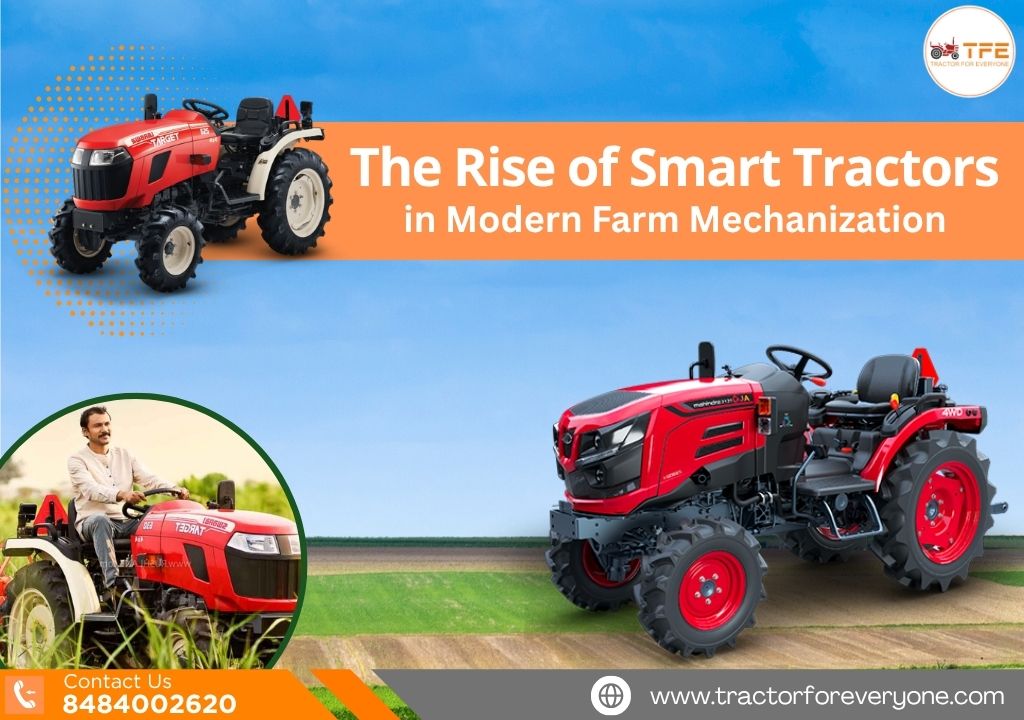
The Rise of Smart Tractors in Modern Farm Mechanization
A few decades ago, farming was powered mostly by human and animal labour. Today, modern agriculture mechanization tractor technology has changed that picture completely. Across villages and large farmlands, tractor mechanization in agriculture has become the core of progress, helping farmers save time, reduce costs, and improve yields. From mechanised tractor farming to precision tractor farming, tractors are now more than machines - they are intelligent partners in every stage of cultivation.
Modern agricultural mechanization with tractors is not just about strength; it’s about smartness. The latest autonomous tractor technology, smart tractor farming solutions, and agricultural IoT for farm machinery allow farmers to make data-driven decisions. Precision agriculture technologies such as sensors, GPS, and drones have made eco-friendly tractors and sustainable farming more accessible and efficient. Even small farm tractor access mechanization is growing through shared-use systems like the tractor sharing Agri-TaaS model for small and marginal farmers, ensuring that innovation reaches every corner of the field.
In this blog, we’ll explore how tractors power modern agriculture mechanization on large-scale farms, highlight the best autonomous tractor systems for mechanised farming operations, and show how smart tractors with IoT sensors optimize crop management and resources. We’ll also look at tractor-driven mechanization benefits - like labour reduction, cost savings, and yield improvement - and discuss challenges of adopting high-tech tractors in fragmented farmland and remote rural areas. From eco-friendly tractor technologies such as electric and low-emission models to digital farming and data analytics in agriculture, we’ll see how tractors are shaping sustainable mechanised farming for the future.
Defining Tractor-Oriented Agricultural Mechanization & Its Impact on Productivity
In today’s world of modern agriculture mechanization tractor systems are becoming the backbone of farm work. Instead of relying solely on manpower or animals, tractor mechanization in agriculture now handles ploughing, hauling, sowing-support and more. That shift to mechanised tractor farming allows farms to do more work in less time, lowering cost and increasing output.
When we look at agricultural mechanization with tractors, the key change is scale and speed. Tractors let farmers turn over large tracts of land, and maintain work rhythm even during busy times. Studies show that when tractors and other mechanised equipment are used, productivity goes up and labour drudgery goes down.
Why do tractors matter so much? A tractor is versatile - it can handle tilling, transport, field preparation, seed-bed making, and even haul crops. As such, it sits at the heart of tractor-driven mechanization benefits. Traditional mechanisation might involve only a few machines; here the tractor becomes a central engine of the farm. In past decades, mechanisation meant simple tractors; today we talk of precision tractor farming, data-driven machines, and interconnected systems. The difference is big.
By embracing the tractor as a key machine, farms large and small can shift from labour-intensive methods to efficient, timely operations. This is what makes how tractors power modern agriculture mechanization on large-scale farms more than just a slogan - it’s a reality.
Latest Tractor Technology Trends: Autonomous, Electric & Smart Tractors
The rise of autonomous tractor technology marks a new era in farming. These tractors can navigate fields on their own, guided by GPS, sensors, and AI. Reports show they reduce overlap and errors significantly, enabling 24/7 operations even in large holdings.
Equally significant are the eco-friendly tractor technologies: electric tractors, hybrid models and low-emission tractor mechanization. As the world pays more attention to sustainability, these models of small farm tractor access mechanization and larger scale farms alike are gaining traction. The shift isn’t just about power - it’s about cleaner power and smarter use.
Then there are smart tractor farming solutions. Tractors equipped with IoT devices, telemetry, sensors and connection to farm software are merging into the broader story of precision agriculture technologies. These smart tractors give farmers dashboards, alerts, and analytics - so they don’t just plough and sow - they manage crops. For many farms, this adoption means less fuel wasted, fewer passes over the field, and better outcomes.
Integration of AI, Automation, Drones & Precision Farming via Tractors
One of the biggest breakthroughs in precision tractor farming is the linkage of tractors to AI, drones and data analytics. Tractors now don’t just move - they sense. With agricultural IoT for farm machinery, sensors on tractors monitor soil moisture, crop health, engine performance. Drones scan fields and feed data the tractor can act on.
Thanks to how smart tractors with IoT sensors optimize crop management and resources, farms can apply fertilizer, water and seed exactly where they’re needed - no guesswork. That reduces costs and improves yields. The tractor becomes a decision-machine, not just a mule.
This kind of integration - how precision tractors integrate AI, drones, data analytics in modern farming - also helps tackle the labour shortage in agriculture and mechanization solutions. When fewer workers are available, these smart systems ensure fields aren’t left idle, thresholds are met, and timing is precise.
Benefits of Tractor-Driven Mechanization: Labour, Cost, Yield
There are clear benefits of tractor-centric mechanization: labour reduction, cost savings, yield improvement. Labour reduction comes because tractors substitute for large teams during peak seasons. When manual labour is scarce, a tractor keeps things rolling.
On cost savings: smarter operations mean less fuel, fewer input wastes, fewer repeated passes. Smart tractors reduce overlap and optimise use of seed, fertiliser, spray - in one study mechanisation cut input cost by 15-20 %.
Yield improvement follows. Because sowing, planting, spraying and harvesting all happen timely via tractors, crop health improves and output rises. The full potential of tractor mechanization in agriculture becomes clear when large farms scale with tractors, and tractor-driven mechanization benefits accumulate.
For larger farms, how tractors power modern agriculture mechanization on large-scale farms means they can manage thousands of hectares instead of hundreds. But even smaller farms benefit when they share or rent tractors (covered next).
Mechanization Accessibility: Agri-TaaS, Tractor Sharing Models, Small-Farm Inclusion
It’s not just big farms that should benefit - small farm mechanization strategies exist chiefly via models like tractor sharing Agri-TaaS model for small and marginal farmers. These let smallholders access high-tech tractors without full ownership.
This matters because many small farms cannot afford full-size tractors or advanced attachments. With the sharing model, they get timely access to tractor mechanization in agriculture and benefits of mechanised tractor farming. Governments and private players support these models through subsidies or tractor-pool programmes.
Barriers remain - service access, training, scheduling - but when these are addressed, even small farms can deploy tractor-driven mechanization benefits and narrow the gap with larger farms. Such inclusion boosts food security, rural income and farm productivity.
Challenges & Barriers in Tractor-Centric Mechanization
Despite the advantages of mechanised tractor farming, several hurdles must be addressed. The initial cost of tractors - especially autonomous tractor technology or smart models - is high. For many small or fragmented farms, the cost burden is heavy.
Farm size and fragmentation can block the benefits of agricultural mechanization with tractors - if a tractor can’t work enough hours or fields are too small, the return on investment drops. Likewise, remote areas often lack service centres, spare parts or operator training.
There are also environmental and soil-health concerns: heavy tractors may cause soil compaction; outdated machines burn more fuel. Then there are regulatory and data-privacy issues when tractors collect field data via sensors. All these mean that even as farm mechanization trends 2025 point upward, practical adoption needs smart planning.
Environmental Impacts, Sustainability & Eco-Friendly Tractor Trends
When we talk about eco-friendly tractors and sustainable farming, the role of the tractor is evolving. On one hand, tractors enable practices like conservation tillage and efficient input use, supporting sustainable mechanised farming: role of tractors, sensors, automation and environment.
On the other hand, the industry is pushing eco-friendly tractor technologies: electric tractors, low-emission tractor mechanization. These reduce the greenhouse-gas footprint of tractor mechanization in agriculture and align mechanisation with global climate goals.
Smart tractors with precision systems reduce waste of fertilizer or pesticides, improving environmental performance while maintaining productivity. The combination of precision agriculture technologies, automation and cleaner machines gives mechanised farming a sustainable path forward.
Case Studies & Global Success Stories Focused on Tractors
Worldwide we see success in how tractors power modern agriculture mechanization on large-scale farms and in smaller holdings too. For example, in India, increased tractor density in states like Punjab and Haryana boosted cropping intensity and yields.
There are also reports of best autonomous tractor systems for mechanised farming operations being field-tested and delivering results - faster sowing, fewer labour hours, better coverage.
In shared-use models, small farmers in clusters hire tractors and benefit from small farm tractor access mechanization. These tell us that the promise of tractor-oriented mechanisation applies across farm sizes and geographies.
Future Outlook: Where Tractors and Mechanization Are Headed
The global market for sustainable agriculture machinery and farm machinery market size and growth shows big growth ahead, especially for smart tractors and autonomous farm vehicles.
Expect full autonomy, electric/hybrid tractors, swarm-robot tractors, more data-centric smart farming equipment. Digital farming and data analytics in agriculture will tie in with tractors, making them platforms of farm intelligence rather than just power.
For farmers and agri-businesses, staying ahead means evaluating small farm tractor access mechanization, investing in smart models, and choosing service models like tractor sharing Agri-TaaS. The future of tractor mechanization in agriculture is unfolding now - and those who adapt will likely lead the next wave of productivity.
Conclusion
Modern agriculture mechanization tractors are no longer just machines - they are the true engines driving the future of farming. From precision tractor farming to autonomous tractor technology, the evolution of tractors has completely changed how fields are worked, crops are grown, and resources are used.
Today’s agricultural mechanization with tractors brings power, intelligence, and sustainability together. The rise of smart tractor farming solutions and agricultural IoT for farm machinery helps farmers make better decisions and manage every inch of their land efficiently. Even small farm tractor access mechanization through Agri-TaaS models ensures that innovation is no longer limited to large farms alone.
Key highlights from this journey include:
- Higher productivity and yield through timely tractor-based operations.
- Reduced labour and fuel costs thanks to smart and autonomous systems.
- Eco-friendly tractors cutting emissions and promoting sustainable farming.
- Better access for small farmers through sharing and rental models.
Of course, there are still challenges - high investment, lack of training, and rural access - but with steady support, tractor mechanization in agriculture can overcome these barriers. As farm mechanization trends 2025 show, the move toward electric, connected, and data-driven tractors will only grow stronger.
Whether you run a large estate or a small holding, staying updated on tractor-driven mechanization benefits gives you a competitive edge. Start exploring smart, sensor-enabled tractors or flexible rental options to boost efficiency and profits.
Modern farming is powered by mechanisation - and the tractor remains at its heart, leading the way toward a more productive, sustainable, and technology-driven future.
FAQ
What exactly is meant by mechanised tractor farming?
Mechanised tractor farming means using modern tractors and smart tools to perform field work faster and more accurately. It replaces manual labour and helps farmers manage soil, crops, and time better. You can read more about practical examples on our website Tractor for Everyone.
How does modern tractor technology improve farm productivity?
Smart tractors use GPS, sensors, and automation to ensure seeds, fertilizer, and water are used precisely. This reduces waste and increases yields, helping both large and small farms save time and money.
What is the role of IoT and sensors in modern tractors?
IoT sensors track soil health, moisture, and crop growth. The data helps tractors operate more efficiently and supports farmers in making data-based farming decisions.
Are autonomous tractors practical for small farms?
Autonomous tractors are still costly but are becoming more affordable through rental and sharing models. You can explore options suited for small farmers at Tractor for Everyone or call us at +91 8484002620 for guidance.
How does tractor mechanisation help in tackling labour shortages?
With fewer people available for field work, mechanised tractors handle most tasks efficiently. They save labour, reduce fatigue, and ensure timely operations, especially during busy seasons.
What are the environmental benefits of using eco-friendly tractors?
Electric and low-emission tractors reduce carbon output and soil pollution. They promote sustainable farming and support long-term soil and air health.
How can small and marginal farmers access modern tractor technology?
Farmers can join tractor-sharing or Agri-TaaS (Tractor-as-a-Service) models to rent high-tech tractors without huge costs. Visit our site Tractor for Everyone to learn about the best access plans near you.
What are the top trends in tractor mechanisation for 2025?
Expect growth in AI-based tractors, autonomous vehicles, precision farming tools, and smart data platforms. These trends are transforming how every farm, big or small, operates.
What challenges do farmers face while adopting smart tractors?
Some challenges include high initial cost, lack of technical training, and limited connectivity in rural areas. However, support programs and shared access models are improving these issues steadily.
How do tractors help in achieving sustainable agriculture goals?
By using efficient machinery and precision control, tractors reduce fuel use, protect soil health, and promote green practices. They play a vital role in sustainable and future-ready farming.
What is precision tractor farming, and why is it important?
Precision tractor farming uses AI, GPS, and data analytics to apply the right input at the right time. This maximizes yield while minimizing costs and environmental impact.
Where can I find reliable information about new tractor models and mechanisation tips?
You can explore trusted insights, reviews, and latest updates on our official website - Tractor for Everyone - or reach us directly at +91 8484002620 for expert help and guidance.
How does digital farming connect with tractor mechanisation?
Digital farming uses software and IoT tools that work with smart tractors. Together, they collect real-time data, helping farmers plan, plant, and harvest more efficiently.
What are some ways to make mechanisation affordable for rural farmers?
Subsidies, co-operative buying, and tractor rental services make modern farming more reachable. Our team at Tractor for Everyone can guide you on these options for your region.
What should farmers consider before investing in a new tractor?
Farmers should check fuel efficiency, automation features, service support, and long-term cost. For tailored advice, visit Tractor for Everyone - your trusted guide for all tractor solutions.
Write a Comment
Popular Blogs View All
-
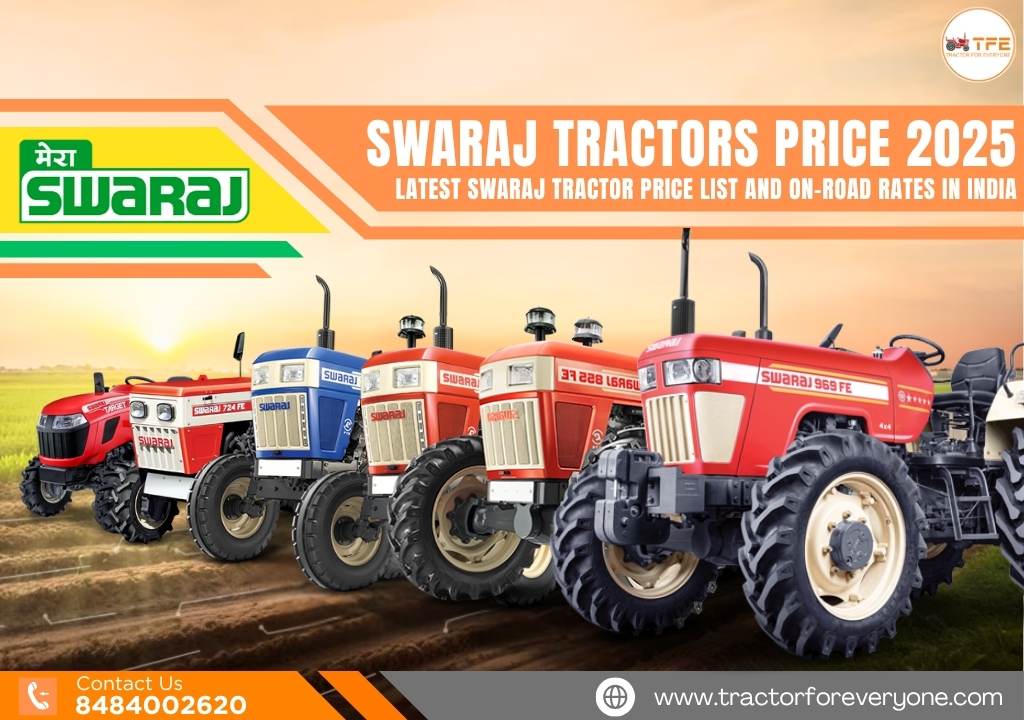
Swaraj Price 2025: Latest Swaraj Tractor Price List and On-Road Rates in India
07/24/2025, POSTED BY ADMIN -
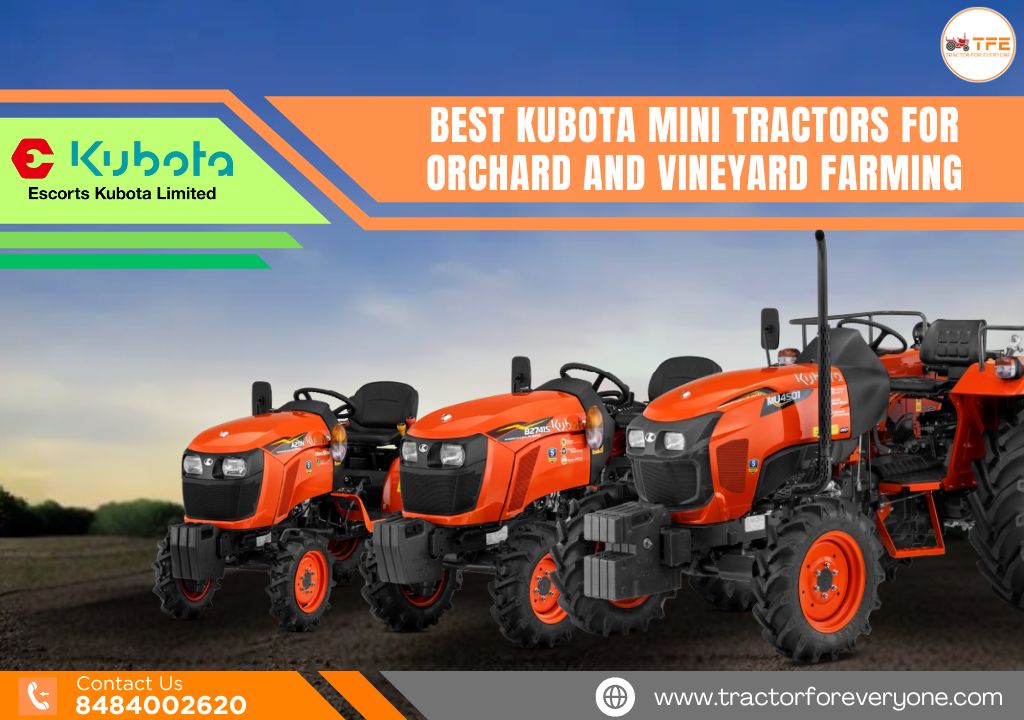
Best Kubota Mini Tractors for Orchard and Vineyard Farming
01/13/2026, POSTED BY ADMIN -
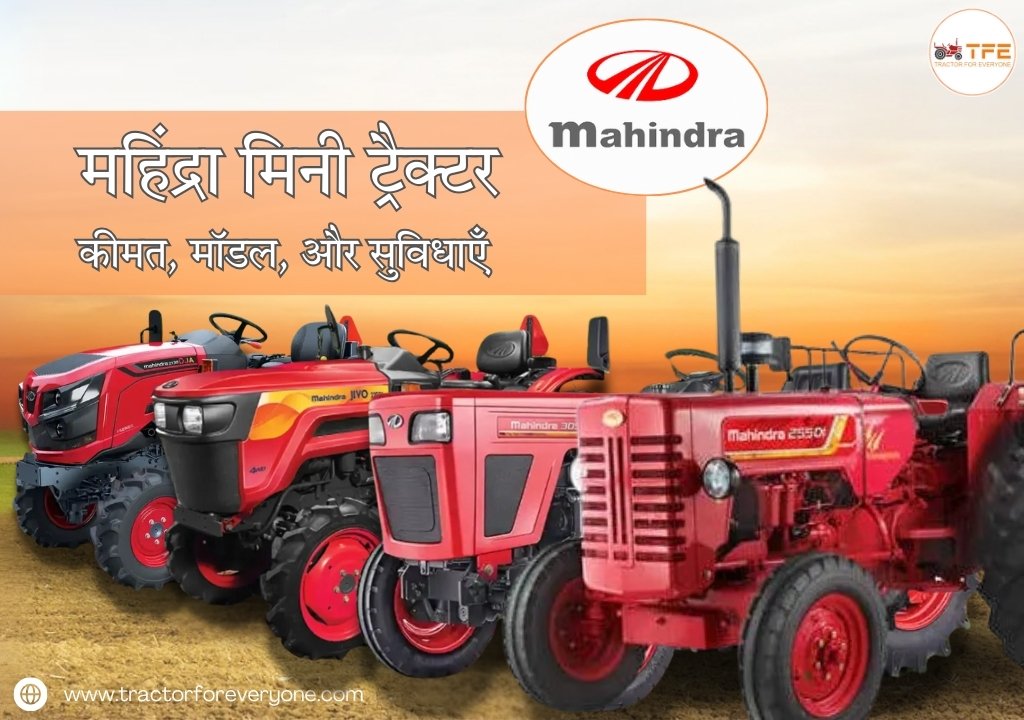
महिंद्रा मिनी ट्रैक्टर - कीमत, मॉडल, और सुविधाएँ
02/18/2025, POSTED BY ADMIN
Popular Video View All
-

महाराष्ट्रात Second Hand Tractors ची उत्तम संधी! तुमच्या बजेटमध्ये, विश्वासार्ह ट्रॅक्टर मिळवा!
12/16/2025, POSTED BY ADMIN -

TFE Reaper Machine Working | Full Multi-Crop Cutting Process!
12/16/2025, POSTED BY ADMIN -
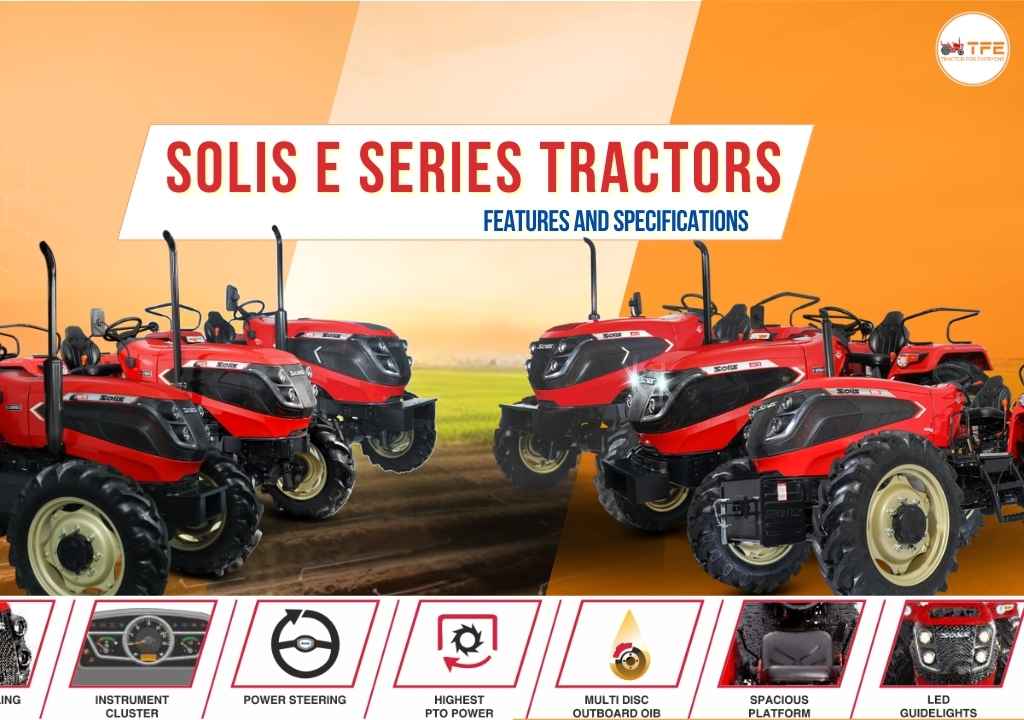
5 Things You Need to Know Before Buying a Solis E Series Tractor
05/17/2025, POSTED BY ADMIN

